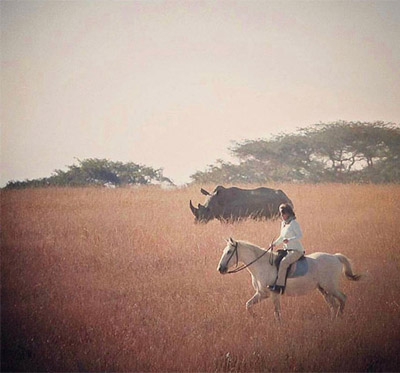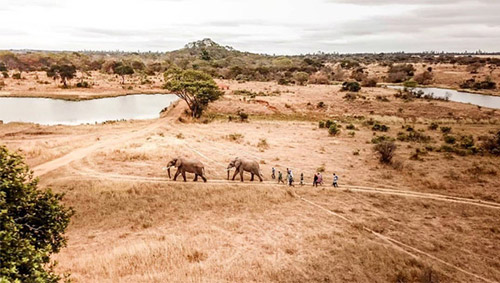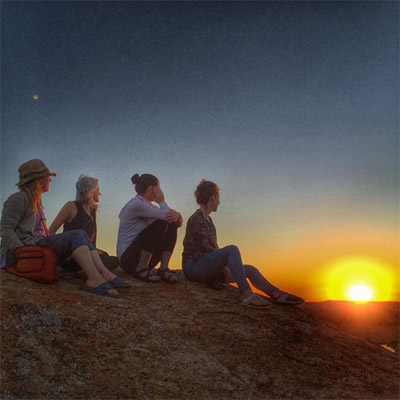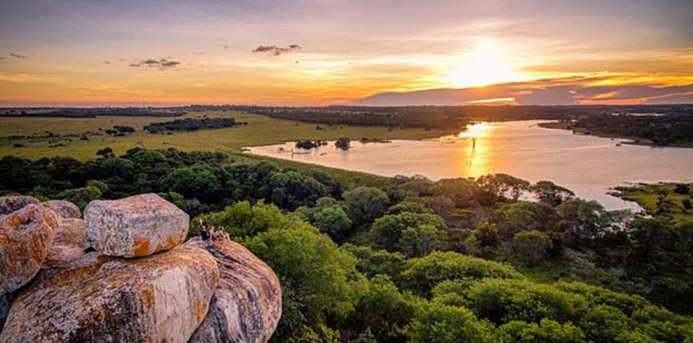Footprints. Everywhere I travel, I look for the footprints of women, and I follow them until I see the path more clearly. It always leads to a circle of women and in these circles I see women sharing stories, women laughing, women dancing, women healing, and women standing for other women. I see the footprints of women lifting up their communities.
On Nov. 15, 2018, I landed in Zimbabwe for the 26th time since 2008. Ten years before, I first arrived there to adopt a baby named Loveness. She died before I got to hold her. At the time, Zimbabwe had the lowest life expectancy in the world. Just as I was arriving, a humanitarian team including Kofi Annan and Jimmy Carter was denied visas to enter Zimbabwe. There was a raging cholera outbreak and a failing economy. I arrived to the news that I’d find Loveness in the morgue instead of in a crib.
On Dec. 2, 2008, I buried Loveness in a circle of mostly women. As I walked away from her grave, I had no idea that I’d carry the legacy of her tiny footprints in mine. Since then, I’ve entered Zimbabwe 25 more times and followed the path.
One of the extraordinary women I’ve met in Zimbabwe through following the footprints is Judy Travers. Like animal conservationists Dian Fossey and Jane Goodall, Judy is dedicated to being a caretaker of the animals of Zimbabwe.

“We are so blessed to be living alongside our wildlife and living as a herd with the elephants, where we are able to learn from these magnificent beasts by understanding them,” said Judy. “We are so privileged to share their energies, their sensitivity, their incredible intelligence, their ability to learn and receive instruction, and their humor. Their incredible protectiveness toward their family is in their everyday footprints.”
Judy’s home is set on Imire Rhino and Wildlife Conservation, an 11,000-acre game park in eastern Zimbabwe. The idea of our footprints sharing the earth with each other is why Judy is a passionate caretaker of all animals, but especially the endangered rhinos and elephants.
“I have been so blessed to have been given this chance in life to love and share my life with animals,” said Judy. “Somehow living so close to nature balances my soul.”

Judy was always a lover of animals, but her life was changed in 2007 when she woke up to the news that nearly all the rhinos at Imire had been killed overnight by poachers, all except one — six-week-old Tatenda, who was found covered in his mother’s blood, traumatized and unable to nurse. Judy went from being a mother of five children to a mother of five plus a baby rhino. She promptly moved the baby rhino into her home. Tatenda was the focus of the Animal Planet documentary “There’s a Rhino in My House.”
When I asked Judy the difference between raising a rhino and raising children, she said, “Oh dear! I feel I may have been better at raising my beloved rhino than I was at raising my beloved children.
The kids, they all brought up each other,” Judy said. “Tatenda was so teeny and vulnerable after losing his mother. He needed and demanded attention and soon became part of the family. His footprint was shared with mine.”
While Loveness first brought me to Zimbabwe, it was my connection to the people — like Judy — and to the animals that kept me returning. Friends asked how to help and then asked if they could join me. Now more people are discovering the beauty of Zimbabwe as it struggles to rise from the wounds of the past. Just recently, National Geographic Traveller included Zimbabwe on a list of “cool” places to travel to in 2019.
Every November, I host a Qoya, Service, and Safari Retreat based at Imire Sable Lodge. It’s a week of service within the local community and unique experiences with the animals focused on supporting the local anti-poaching programs. In six years, over 50 guests have joined me on these transformational retreats. During two of our retreats, our group was able to see two new baby rhinos that were born at Imire’s acclaimed breeding program, led by Judy’s son, Reilly Travers.
Each year our retreat group teams with Judy to work on a local project that benefits the community. I’ve found that collaborating with Judy and listening to what is needed is an effective way to successfully fund projects. By keeping the projects under $10,000, we make sure that every dollar counts.
In 2016, Thomas McKinnon, a tech expert from Virginia, joined his wife, Lindsay, on the Qoya, Service, and Safari Retreat and made miracles happen by deploying a 10-station computer lab in a solar-powered library in the middle of the bush! For the first time ever, locals have access to computers and the internet, something that helps connect them for business, education, and research.
Lindsay and Tom came on the retreat after a home fire six months earlier claimed the lives of their boys Patrick and Logan. They took their grief out into the world and continued to be of service. Lindsay wrote a powerful story about Zimbabwe and the healing soul of elephants that she experienced during the retreat. Six months after their first trip to Zimbabwe, Lindsay returned to co-host a Qoya retreat with Elan Vital McAllister.
“The Qoya, Service, and Safari Retreat was one of the pivotal moments Tom and I had since our fire,” said Lindsay. “It was when we started relaxing into the chaos that comes with grief. We started having fun, and we started reaching outside of ourselves. We started sitting in that spot that whispers, “The past is gone; the future is not yet here.” It was a game changer. To be so moved by the people, landscapes, and animals of Zimbabwe was nothing short of a miraculous gift for us. And you know what? It didn’t even take a miracle. It took an invitation from a friend — Betsy, who knew something we did not yet know, and then we trusted her.”
It’s the trip of a lifetime, so it’s not surprising to see people return.

In November 2018, Barbara Tarbel of New York City and her daughter Sophie Tomasulo joined me for their second retreat to Zimbabwe. They first joined me in 2013 when Sophie was 11 years old. Now 16, Sophie and her mom chose to return to Zimbabwe.
“From working with endangered rhinos to playing with bubbles at a local school, I would do it all over a thousand times and suggest others do the same,” said Sophie. “Being welcomed with open arms not only showed me how inherently angry and aggressive our culture is, but how appreciative and happy others are.”
This year, Barbara, Sophie, and friends generously donated funds for a new workspace for the women’s empowerment group. The group established themselves several years ago as a way to uplift and be of service to the community. Their first project was to sew uniforms for the local school children. For many of the children, it’s the first new piece of clothing they have ever received.
The group continues to sew uniforms; we donate money for the materials every year. Their newest project is producing a kit of reusable cotton pads for girls to use during their periods. When a girl has her period in poor, rural areas of Zimbabwe, she may miss up to five days of school each month because she doesn’t have supplies. On the day we visited the women’s group, they were working on an order of 10,000 kits, so we pitched in to help sew — there were 10 of us working in a small space with little protection if it rained. We returned on Thanksgiving Day to share the news of a bigger space to be donated by Barbara and friends, and the women responded with singing and dancing. Our footprints mixed with theirs in the red soil of Zimbabwe.
“The retreat made an impression on my heart,” said Barbara. “We are happy to have been able to donate the container for the women’s group.”
One thing we continue to do is to listen to the women.
It was women who said the children needed new uniforms, so we made it happen (and continue to do it every year).
It was women who requested new books for the school, so we made it happen.
It was women who suggested a library and computer lab would benefit the entire community, so we made it happen.
It was women who pointed out there was one clinic for delivering babies within 60 kilometers in this rural area of Zimbabwe. Could we help?
“Previously when a mother went into labor in this rural area, she would walk 10 to 60 kilometers to the clinic, deliver, and then begin walking home with a newborn,” said Judy.
Through fundraising and the retreat by Lindsay and Elan, we funded a Mother’s Shelter at the clinic and also provided Life Wraps, a lifesaving device for post-partum hemorrhaging. The Life Wrap costs less than $250. So far the life wrap at the clinic has saved the lives of four mothers.
Judy said, “Now mothers can come early, receive pre-natal care, deliver, and stay at the Mother’s Shelter with her baby. “
Much of the shelter was funded by Linda and Becca Kannapell of POUND Jewelry who had never been to Zimbabwe but they created a unique POUND pendulum made from hematite to benefit the shelter (and now the elephants). In 2018, Linda and Becca joined me in Zimbabwe to see the impact of their donations.
“During the Qoya, Service, and Safari Retreat, we were able to visit the clinic, the library, and the schools. We stayed at Imire Conservation and meet the ellies, rhinos, and the incredible people that have dedicated their lives to caring for them,” said Becca. “These animals have all been rescued and given the chance to live their lives as peacefully and freely as possible. There are only about 400,000 African elephants left. Over 140,000 have been killed in less than a decade. Only about 5,000 Black Rhinos are left: a 96 percent decline over 20 years. Having spent time with these animals at Imire was nothing short of a miracle to us.”
It is women who continue to show up, listen, and take action. After the trip, Sophie wrote on Facebook, “Overall, while posting about countries that we help is informative and a great first step, actually making moves and stirring action is even better and still equally as achievable. Donating to wildlife conservations (like Imire Zimbabwe) and looking into small projects to support is where the change will really begin, a long overdue and exciting change. We are better than just awareness, we need movement!”
We know that by investing in local women, we will be offering opportunities for entire communities. We know that by protecting the animals, we ensure that our grandchildren will be able to continue to share their footprints on the sacred soil of Zimbabwe.
If you feel called to support our ongoing projects, you can make a (501c3) donation through our fiscal sponsor, From the Heart Productions. All amounts are appreciated.
You can also visit Imire throughout the year as a volunteer or join us in Zimbabwe Nov. 17-24, 2019 for a life-enhancing experience. It’s the trip of a lifetime — and you just may find you are called to do it more than once. Where will your footprints lead you next?
POUND Jewelry has two pieces benefitting Imire Rhino & Wildlife Conservation:
Betsy Blankenbaker Murphy is a writer and storyteller. She writes about spirituality and sensuality. The U.K. Sunday Times called her first book, Autobiography of an Orgasm, “refreshingly sincere.” Murphy leads writing and Qoya retreats all over the world including the Qoya, Service, and Safari Retreat in Zimbabwe. For more details: betsybmurphy.com

